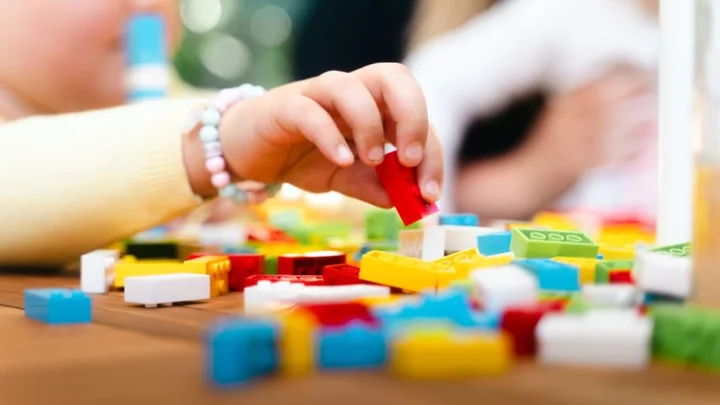
Jerry Seinfeld Hints That “Something“ Is Happening When Asked About a 'Seinfeld' Reunion
The comic teased that we may not have seen the last of Jerry, George, Elaine, and Kramer.
2023-10-11 04:49

Prince Harry and Meghan to talk about youth mental health during New York City event
Prince Harry and his wife Meghan Markle are hosting a conference in New York City on how the internet and social media affect youth mental health
2023-10-11 02:58

8 Victorian Scientists Who Investigated Ghosts
Some 19th-century scientists embraced psychical research, while others tried to debunk the sensational stories.
2023-10-11 02:29

You Can Get Top-Rated Tech Products For Their Lowest Prices Of The Year During October Prime Day
With these October Prime Day tech deals, you can save on Apple AirPods, Bose QuietComfort Earbuds II, and so much more.
2023-10-11 01:24

More states are teaching financial literacy. It could pay off for students struggling with math
More states are requiring personal finance education before students graduate from high school
2023-10-11 00:56

October Prime Day 2023: The 25 Best Overall Deals to Shop Now From iRobot, Sony, Breville, and More
Discover the overall best Prime Day deals from top brands like iRobot, Apple, Sony, and others with this October Prime Day 2023 roundup.
2023-10-11 00:21

Geraldine Brooks' 'Horse' and biography of George Floyd win Dayton literary awards
Geraldine Brooks’ “Horse,” a novel about race and forgotten history, and Robert Samuels’ and Toluse Olorunnipa’s “His Name Is George Floyd: One Man’s Life and the Struggle for Racial Justice” have won awards from the Dayton Literary Peace Prize Foundation
2023-10-10 22:16

World Mental Health Day: 5 ways to beat anxiety and change your life
Anxiety is something that touches most of us, to a greater or lesser extent. Although it may just be a temporary blip for some people, for many, anxiety is a diagnosed condition that blights their lives. Indeed, Mental Health UK estimates more than one in 10 people in the UK are living with an anxiety disorder – that’s over eight million of us. And World Mental Health Day (October 10) is a chance to address the topic, agrees clinical psychologist Dr Kirren Schnack – author of the new book Ten Times Calmer: Beat Anxiety And Change Your Life. “It’s a reminder that mental wellbeing is just as important as physical health,” she says, pointing out that anxiety disorders are among the most widespread mental health issues globally. “Clinically, I’ve seen more and more people coming in with anxiety issue. The pandemic has played a significant role in this surge, introducing unprecedented levels of uncertainty, fear, and social isolation. At the same time, global economic instability and job losses have intensified stress and anxiety for many,” Schnack adds. “The widespread use of digital technology and social media has exposed people to a constant stream of alarming news and comparison-driven content that also feeds anxiety.” Schnack explains that anxiety disorders include generalised anxiety disorder (GAD), which causes chronic worry and hinders decision-making; health anxiety, where there’s an excessive preoccupation with diseases and illness; panic disorder, which is marked by sudden overwhelming panic attacks; and social anxiety, which leads to avoidance, isolation and low confidence. “They can blight daily life through physical symptoms, cognitive impairment, social isolation, disrupted routines, and emotional distress,” she says. Schnack suggests these five ways to combat anxiety problems and find calm… 1. Calm your stressed nervous system Anxiety places significant strain on the nervous system, Schnack explains, but there are simple daily practices that can help alleviate this stress. One is focusing on breathing, extending your exhale longer than your inhale. To do this, Schnack says you need to inhale gently through your nose, pause for a few seconds, then exhale slowly and deeply, ensuring an extended exhale. “A longer exhale helps by increasing the activation of the body’s parasympathetic nervous system, which counteracts stress hormones, lowers heart rate, and reduces overall physiological stress,” she says. She suggests around three to five of the breaths are repeated on multiple occasions throughout the day, and stresses that consistency is key. “Recognise that if anxiety has been a longstanding presence, it will take time and patience to restore your nervous system’s sense of safety and stability.” 2. Address anxious thoughts Schnack explains that anxiety often generates anxious thoughts that can seem like undeniable facts that are often dwelled on and reacted to, thus intensifying anxiety. “To break free from this cycle, it’s crucial to consciously confront and process these anxious thoughts,” she says. To do this, write a simple record, noting the date of your anxious prediction, describing what it was, and then, after a specified time like a day or two, return to what you’ve written and confirm whether the prediction was accurate by marking it as ‘yes’ or ‘no’. When the prediction doesn’t materialise, make a note of the actual outcome. Revisit the record, especially during anxious moments, and count the yes or no entries to reflect on your progress. “This practice trains your mind to adopt a broader, less anxious perspective,” explains Schnack. 3. Stop over-focusing on anxiety“People struggling with anxiety often find it challenging to shift their attention away from anxiety symptoms, leading to a persistent preoccupation that can worsen their problems,” says Schnack, who explains that this preoccupation can lead to excessive self-analysis, fixation on physical sensations or repetitive thoughts, and being hypervigilant. To shift your attention away from overwhelming anxiety, Schnack suggests trying this exercise: choose a colour, such as blue, and actively seek out blue objects in your surroundings. Name them out loud, and count them as you move around, possibly describing the item too. “Strive to maintain this focus for a few minutes, switching to different colours if necessary. Again, consistency is crucial, so make an effort to practice this regularly whenever anxiety hijacks your attention,” she advises. 4. Learn to tolerate uncertainty Recognising and addressing uncertainty is vital when dealing with anxiety, Schnack stresses. “You can’t resolve every uncertainty in life – the key lies in enhancing your ability to tolerate uncertainty so you can reduce your anxiety,” she explains. “Being more accepting of the fact that things may not always go as planned or that the future is uncertain can be incredibly liberating.” To help build resilience against uncertainty, Schnack advises people to take a moment to slow down and not immediately engage in reactive behaviour demanded by uncertainty, such as checking, Googling or avoiding things. Instead, she says, note your feelings, observing what uncertainty is doing to your mind and body, and write out an affirmation such as: ‘I’m feeling anxious because I’m uncertain about… My typical response to uncertainty is to engage in… behaviour. I recognise this only worsens my anxiety. My goal is to distance myself from anxiety rather than gravitate towards it. I can sit with the feeling of uncertainty for as long as I can, and build on this time until I get better and better at it.’ 5. Gradually face your fearsConfronting your fears is an effective way to overcome them, observes Schnack, although this can often feel overwhelming. “When you confront your fears, you’re essentially acting in opposition to your anxious thoughts and what anxiety is telling you. This process weakens anxiety’s grip on you, and when the actual outcomes don’t align with your anxious predictions, your mind can naturally adjust its thinking.” She suggests starting with small steps and gradually building up. So, for social anxiety, gradually start by saying a simple sentence or asking a basic closed question, and gradually building up from there. For health anxiety, gradually reduce and eliminate excessive online researching about illness and diseases, starting with small-time durations and then building on that. For panic disorder, gradually spend more time in places you typically avoid, starting with short durations like 30 seconds, then a few minutes, and gradually keep increasing the time. “Remember to repeatedly face your fears to make meaningful progress – it’s not just a one time thing,” adds Schnack. Ten Times Calmer: Beat Anxiety And Change Your Life by Dr Kirren Schnack is published by Bluebird, priced £16.99. Available now. Read More Alternative veg to grow for next season How to spot if your child is struggling with their mental health – and what to do next Does your pillowcase make a difference to your skin and hair health? Sarah Jessica Parker channels Carrie Bradshaw on the red carpet in mismatched shoes Does your pillowcase make a difference to your skin and hair health? As transphobic hate crimes rise by 11% in a year, how to be a better ally
2023-10-10 14:16

LEGO’s New Braille Bricks Are Here—Just in Time for Blindness Awareness Month
LEGO’s new bricks in honor of Blindness Awareness Month form braille symbols with the toy’s classic studs.
2023-10-10 05:29

Elizabeth Hurley issues reminder to women about getting mammograms as she raises awareness about breast cancer
Elizabeth Hurley has issued a reminder to women about getting mammograms, in honour of her partnership with Estée Lauder’s Breast Cancer Awareness campaign. The model, 58, spoke candidly about mammograms – which are X-rays performed on women’s breasts to screen for cancer – during a recent interview withUs Weekly. While discussing her last 28 years as the ambassador of Estée Lauder’s campaign, she told women that if they feel something “abnormal” when examining their bodies, they shouldn’t hesitate to get it checked by a doctor. “I think the most important thing you can do is familiarise yourself with your breasts because they’re yours and only you know how they feel,” she said. “You should recognise something when it’s abnormal, and you should go to the doctor right away.” Hurley emphasised that annual screenings for breast cancer are not only “vital,” but they should be considered a part of “looking after your health in every way”. She also went on to urge women to be “breast cancer bullies” by continuing to encourage their loved ones to get checked for the disease. “Make sure your friends, your family, your mother, your grandmother, that they’re going for their screenings regularly and urge them to self-check,” she said. “It doesn’t discriminate. It can hit anybody. Some groups are more vulnerable than others.” She also made a reference to one breast cancer that can be difficult to treat, triple-negative breast cancer, which “differs from other types of invasive breast cancer” because “it tends to grow and spread faster, has fewer treatment options, and tends to have a worse prognosis”, as noted by the American Cancer Society. The type of cancer can also be “more common in women younger than age 40, who are Black, or who have a BRCA1 mutation”. “It disproportionately affects Black women,” the Bedazzled star added. “It’s a diverse disease and it needs to be attacked in a diverse way.” According to the American Cancer Society, women between the ages of 45 and 54 “should get mammograms every year”. Meanwhile, women who are 55 and older can either “switch to a mammogram every other year, or they can choose to continue yearly mammograms”. In addition, women between the ages of 40 and 44 “have the option to start screening with a mammogram every year”. The organisation also noted that breast cancer is the most common cancer in women, with estimates of “about 297,790 new cases of invasive breast cancer” being diagnosed in women in the US in 2023. Over the years, Hurley has continued to speak about the importance of getting a mammogram. Last year, she joined Loose Women hosts Kaye Adams, Brenda Edwards, Nadia Sawalha, and Carol McGiffin for a self-examination on live TV. During the segment, she also opened up about losing her own grandmother to the disease, and how her attitudes towards breast cancer have shifted over time. “At that time nobody talked about it. There was no pink ribbon, no Breast Cancer Awareness month,” the Serving Sara star said, adding that when her grandmother first found a lump in her breast, she didn’t go to the doctor because she was “scared and embarrassed”. “When she finally went it was quite progressed. But she still never talked about it,” the model continued. “It’s still a life-threatening disease for many women, but times have changed. We talk about it now.” During her interview with Us Weekly, she went on to celebrate her 28th year with Estée Lauder’s Breast Cancer Awareness campaign, noting that Estée Lauder’s daughter-in-law, Evelyn Lauder, is the one who first asked her “to get involved” with the mission. “That’s how it started, and I’m still here. We’ve raised $118m, 93 million of which went straight to research,” she said. “The rest went to education, medical services, support groups [and more]. It’s a phenomenal achievement.” Read More Big Brother narrator Marcus Bentley: Meet the man behind TV’s most recognisable voice ‘Not guilty’: Elizabeth Hurley reacts to rumours she took Prince Harry’s virginity Elizabeth Hurley slams British Airways’ ‘dodgy service’ after getting stuck in Antigua Like Sophie Anderton, I have felt the shame of struggling to have a child of my own How to spot if your child is struggling with their mental health – and what to do next How to get rid of bedbugs: Signs and symptoms amid threat of UK invasion
2023-10-10 05:16

Audio Invasion: How the Theremin Went From Soviet Labs to Hollywood
The theremin—a spooky instrument that scored the biggest sci-fi films of the 1950s—was invented by accident.
2023-10-10 03:21

The Best Time to Buy a Christmas Tree
Technically, the most cost-efficient time is December 26. But your kids probably won't like that.
2023-10-10 01:21
